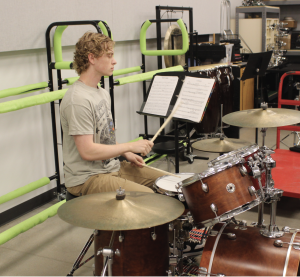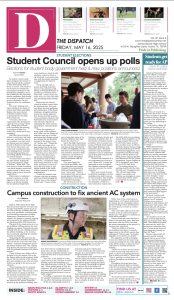The rising “flex” culture changes customers purchases
KICKED BACK: Senior Ethan Ramirez poses in front of his father’s orange Lamborghini. Although Ramirez does not drive the Lamborghini to school for saftey reasons, he does drive a 2005 Toyota Tacoma truck.
March 23, 2020
With the rise of social media taking over society and the constant craving for something new to show off, luxury items have started to consume the lives of students. This has slowly become known as “flex” culture, which does come at a hefty cost.
Although for some students it is not just about purchasing and wearing these items to participate in flex culture, but rather they value the quality and worth of each item. One of these students is senior Ethan Ramirez.
“I prefer to purchase investment pieces, so basically items that will appreciate in value over time,” Ramirez said. “Meanwhile with some other people they like to wear and purchase things to make it look like they’re worth more just to flex.”
For Ramirez owning and purchasing such items, is rather not about the “flex”, but instead he focuses more on the fashion aspect. He makes sure to spend time considering what he is purchasing and taking into account the quality and value of each item.
“I shop for items daily, both in store and online, but personally I like to shop in store more. When you shop in store for luxury items you get the full experience, and sometimes they will give you stuff for free, if you come in often enough,” Ramirez said. “At every store I go to I have a specific person that I go to, since they get paid off of commission and I love to support them.”
However for some, purchasing more expensive brand name items, provides a feeling of accomplishment. For senior, Riley Hughes appreciating her expensive items is something she makes sure to do.
“I really do value all of the designer items that I own, I understand their worth and for that reason I treat all of my items with extreme care,” Hughes said.
However, being a part of “flex” culture doesn’t just limit students to purchasing over-the-top expensive items. Ramirez also shops for more affordable clothing pieces as well.
“So I have definitely leaned more towards affordable items of clothing, but with higher quality like Lululemon and Outdoor Voices, still luxury athleisure brands. But I am leaning away from major fashion designers just because they are starting to become cheaper quality because they are mass producing their products now.”
For many students the expense of luxury items, becomes worth the cost because of the feeling that they receive after getting the item makes it worth it. For junior Vincent Nguyen, he is always on the lookout for the new items
“I feel good when I make one of these purchases, but a little unsettling since it’s so expensive and I feel like I could’ve gotten more with the money I had then just one item,” Nguyen said. “But it’s a good feeling like a feeling of anticipation to when you can wear it and ‘flex’ it to your peers.”
According to English teacher Jaqueline Gonzales, in high school it can become easy to get accustomed to being able to afford more pricey items, if your parents are paying for it or even saving money to purchase such items. She believes that students need to make sure that what they don’t become too invested in “flex” culture, because it can lead to bad financial choices down the road.
“Generally, my opinion is that if you are able to spend money and you have the means to go for it and do what you want, but I think sometimes I think it’s better to be more proactive with saving and making sure you are secure and safe, especially outside of high school context,” Gonzales said. “I would not put my bills at jeopardy for buying a hydro flask personally, but anything goes, I won’t knock people for choosing to do that but there are other things that you should think about like big money questions.”
In some cases people view purchasing such expensive items as an achievement and something that they are proud of and have worked towards. Gonzales reflects on the money aspect of this concept of “flexing” and believes people should keep in mind the effect of the decisions they make.
“If you have earned money and you have worked really hard for it, it’s totally valid to spend it on what you want,” Gonzales said. “If that is something that is important to you, like showing your work in that way.”









Rafat • Oct 9, 2022 at 10:39 am
Which lambo is it?